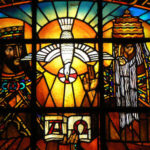We run our website the way we wished the whole internet worked: we provide high quality original content with no ads. We are funded solely by your direct support. Please consider supporting this project.

Knowing and Experiencing God
The way we view God is in part conditioned by the state of our minds and hearts. Origen put it this way: “[T]he Holy Spirit addresses our nature in a manner appropriate to its imperfection, only as far as it is capable of listening.”[1] In fact, Origen went so far as to argue that the way Jesus’ contemporaries viewed him was conditioned to some degree by the state of their soul. In other words, for Origen, it wasn’t only after the resurrection that people viewed Jesus according to their spiritual capacities.
Many patristic fathers subsequently appropriated the insight that we experience God’s revelation according to our spiritual capacities. In fact, this concept has in one form or another factored into the theology of almost all of the Church’s chief theologians, playing an especially strong role in those who have been influenced by the principal “like is known by like.”
This principal has been articulated and defended in recent times by T. F. Torrance who discerns in it in the way that human knowledge works in general. He writes:
All genuine knowledge involves a cognitive union of the mind with its object, and calls for the removal of any estrangement or alienation that may obstruct or distort it. This is a principle that applies to all spheres of knowledge, and not simply to our knowledge of God.[2]
Speaking specifically of our knowledge of God, Torrance writes:
The closer people draw near to God, the more integrated their spiritual and physical existence becomes, and the more integrated their spiritual and physical existence becomes, the closer they may draw near to God in mind and being in ways that are worthy of him.[3]
The converse is also true, however. The more estranged people are from God, the more their knowledge of him is obstructed and distorted. In this sense, we must acknowledge an important element of truth to Ludwig Feuerbach’s famous proclamation that humans make God in our own image. While I would of course reject his claim that God is nothing but a projection of humans, I think it is biblical and reasonable to concede that the way individuals and groups conceive of and experience God reflects the spiritual condition of their heart (along with a number of other factors, such as their psychological make up and their cultural conditioning).
In light of this, I’d like to suggest that we think of our conception and experience of God along the lines of a Rorschach test. That is, I submit that the way we imagine and experience God says at least as much about us as it does God. When we yield to the Spirit, we are empowered to discern the true glory of God “in the face of Jesus Christ” (2 Cor 4:6). While we must always acknowledge that until the consummation of the age we can see only through a dim glass (I Cor 13:12), it is the revelation of God in the crucified Christ that must function as the ultimate criteria by which we assess the extent to which any conception and experience of God is accurate or inaccurate.
Hence, to the extent that our conception and experience of God conforms to the character of God revealed on the cross, we may conclude that the Spirit has managed to break through our limited and fallen hearts and minds. But to the extent that our conception or experience of God fails to conform to this character, we must conclude that our limited and fallen hearts and minds have resisted the Spirit.
This leads us to a crucial question: How is the spiritual condition of your heart influencing your ability to see and experience the truth of God as revealed on the cross?
[1] Fragment on Ps.11:4, in J.B. Pitra, ed., Analecta Sacra Spicilegio Solesmensi (Tusculum: xxx, 1884) II, 465.
[2] T. F. Torrance, Mediation of Christ (Colorado Springs, CO: Helmers & Howard, 1992), 24-25.
[3] Mediation, 26.
Photo via flosca via VisualHunt.com
Category: General
Tags: Character of God, Revelation, The Holy Spirit
Topics: Attributes and Character
Related Reading

The Cruciform Center Part 4: How Revelation Reveals a Cruciform God
I’ve been arguing that, while everything Jesus did and taught revealed God, the character of the God he reveals is most perfectly expressed by his loving sacrifice on the cross. Our theology and our reading of Scripture should therefore not merely be “Christocentric”: it should be “crucicentric.” My claim, which I will attempt to demonstrate…

The Holy Spirit Behind the Scenes
In John 17 we read Jesus’ prayer to be one with each another in Christ. Jesus prayed that his disciples … may be one. As you, Father are in me and I am in you, may they also be in us. … I in them and you in me, that they may become completely one,…

Does the Holy Spirit Still Do New Things? (podcast)
Greg explores the nature of God’s revelation, as it pertains to scripture and the Holy Spirit. Episode 636 http://traffic.libsyn.com/askgregboyd/Episode_0636.mp3

The Most Beautiful Truth
Jesus was God incarnate. Yet he continually referred to, and prayed to, God the Father as someone who was distinct from himself. He also continually referred to, and claimed to be empowered by, God the Holy Spirit as someone distinct from himself. And yet Jesus, along with all Jews of his time, believed there is…

Redefining Transcendence
God is transcendent, which basically means that God is “other” than creation. The problem is that classical thinking about God’s “otherness” has been limited to what reason can discern about God. As a result, all that can be said about his transcendence is what God is not. We are thus unable to acquire a positive…

Revelation 17:8 refers to people whose names haven’t been written in “the book of life from the creation of the world.” Doesn’t this conflict with open theism?
As in Revelation 13:8, the clause “from the foundation” (apo kataboleis) need not mean “from before the foundation” but simply “from the foundation” (= since the foundation). It’s not that names either were or were not written in the “book of life” before they were ever born. Rather, throughout history, in response to the choices…
